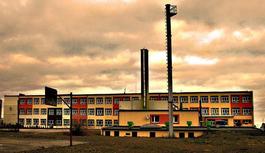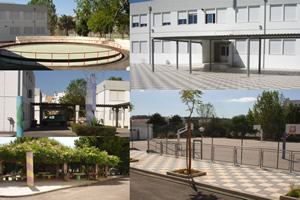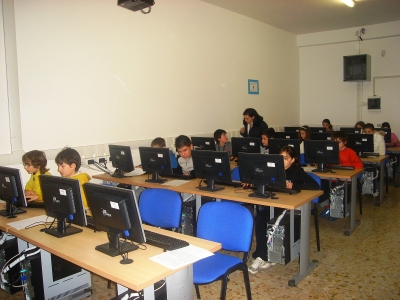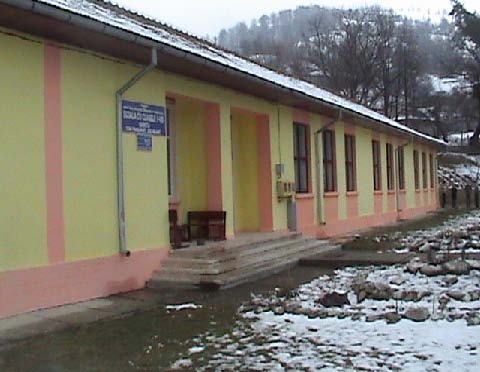Navigation
· THE PLATFORM
· IN the project!
· Useful liks
· Downloads
· Photo Gallery
· Partners in the project
· Teams
· Evaluation
· Search
Users Online
Login
Shoutbox


Partners in the project
Publiczne Gimnazjum nr 1 im. Franciszka Becinskiego from Radziejow/Poland is a generaly secondary school with 250 students aged between 6 and 16 years old, The school is located in a small, rural town of 5000 inhabitants, which does not offer economic perspectives to the youngsters.
Many young people after graduating leave the town to study and work in bigger cities. They do not see many perspectives for them here. That situation causes problems among students at school as they cannot see any future for them in our town. They have no big motivation to study foreign languages and they do not have many opportunities to get to know people from other cities, not to mention from other countries. High rate of unemployment is a main factor that causes poverty, which is seen among some of our students, unwillingness to learn and no motivation to search for solutions. On the other hand plenty of students want to get to know about other countries, their cultures and languages. All these factors cause that among our students there are ones with disabilities, special needs students and those who have committed minor crimes, and offences. The teachers, in our school, try to find as motivating ways to teach them as possible, but possibilities are limited. Our school, taking part in this project hopes that it will be a good start to encourage teachers to find out more about new methods of teaching through the Internet, computers and other ways of communicating. The students and teachers of Publiczne Gimnazjum nr 1 im. Frańciszka Becińskiego want to take part in this project because of many reasons. First, the teachers may find new ways of teaching languages or any other subjects. They want to exchange their ideas with others in order to show their students the ways how to work and live in Europe throughout self-education, motivations and new tools in which students and teachers will be equipped. Secondly, the teachers hope to enrich their methodology and the way of running school as well as equip school with tools that will help them to be more prepared to meet the needs and expectation of a modern school. The teachers believe that their students will be more motivated to learn how to learn and live in modern Europe. The school consists of 290 students and 23 teachers. At school students attend to 12 classes and they graduate school after 3 years of studying. School curriculum comprises of multiple subjects such as mathematics, biology, chemistry, physics, English, geography, IT, PE, history, music and Polish. Our school offers a wide range of after class activities which develop students’ hobbies or help them to deal with difficulties they come across during their stay here. Our participation in the project is a good chance to improve students’ language and computer skills. All the teachers are willing to join the idea of electronic platform .

Escola EB 2,3 de Vialonga/Portugal
Vialonga is a suburban town of 20 000 inhabitants, situated about 20 Kms from Lisbon. The new buildings, inhabited by middle class young couples, contrast not only with some old houses but also with social housing of the surrounding neighborhood (about 30 years old), where the population is means deprived, most of them immigrants from the former Portuguese colonies in Africa.
The real needs of these families and the necessity for a full and balanced integration of the young people into the local community, led by the Ministry of Education to establish that our school formed a Território Educativo de Intervenção Prioritária, in 1996, which means a group of schools with special needsdue to social, economic and cultural problems of the local resident population.
Our school is part of one of these groups of schools and it is now called Agrupamento de Escolas de Vialonga (Group of Schools of Vialonga). It consists of three nursery schools (3-5 year-old children), seven primary schools (6-10 year-old students) and a secondary school (young people from 11 to 15 years old), where students are expected to complete compulsory education.
There is a risk of leaving school as early as 5th grade and this is mostly related to non-academic achievement and the coming of adolescence. In many cases these teenagers’ families are poor. Many do not have a family or their support.
After identifying a need to fight the huge numbers of non-academic achievement, our school has decided to adapt a different approach to this reality. So, we have been working with three different teaching and learning strategies – Alternative Curriculum Courses, Professional Courses and Functional Curriculum – and we have been trying to adapt them to our students’ characteristics.
Scuola Secondaria 1 grado „Luigi Pietrobono” from Frosinone/Italy has 500 pupils with ages between 6 and 16. The school offers courses of music, having an orchestra, as well as courses of foreign languages (English and French). There is no special experience in the European projects, this being only the second project in which the school participates, but the institution desires to apply a coherent program of using computers in teaching foreign languages, considering that, in this way, the theoretical knowledge and skills are combined in favour of pupils and teachers, forming real European citizens, polyglots and with increased skills in using computers. . Learners may have gone through previous educational failure in their past years and are not particularly keen on theoretical studies. Among them some disabled or special needs students. In recent years we have enrolled more and more extra communitarian students. For this specific reason the topics of integration and the defeat of xenophobia are considered essential into a general process towards democracy. The school considers comparing and exchanging excellent educational practice may contribute to the enlargement of the cultural horizons, to the enhancement of the Institution, to a general growth of its potential and to improve the target results.






